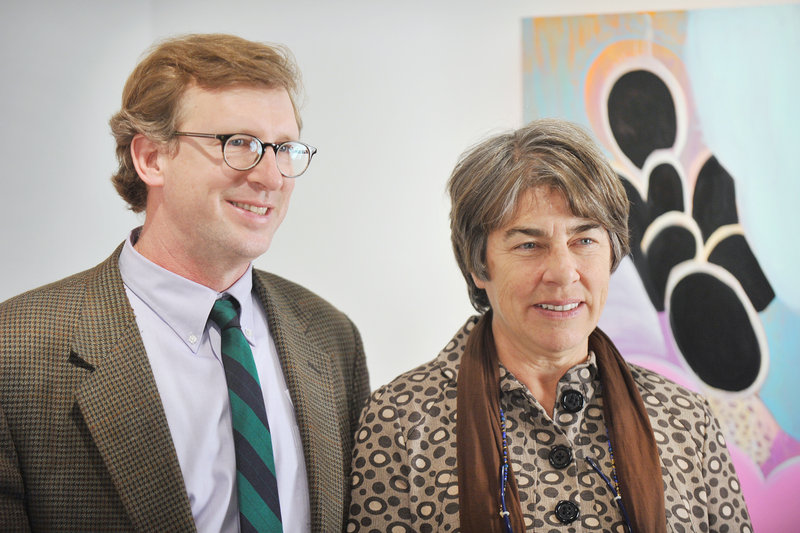PORTLAND — The Maine College of Art and Burt’s Bees co-founder Roxanne Quimby will merge the Quimby Colony with MECA’s curriculum offerings, creating a new fashion-and-textiles study track at the art school.
Quimby, who began her art colony in 2009 in hopes of drawing fiber artists from across the country to Portland, has given the school $400,000 to support artists in residence, new faculty positions, student recruitment, and equipment and resources to begin the program. It will focus on fashion and textiles, with an emphasis on design, said college President Don Tuski.
The fashion-and-textiles program will begin in the fall with two classes, then expand to a minor study track and eventually a full-blown major, he said.
“If this works right, five years from now there will be a whole fashion industry here in Portland,” said Daniel O’Leary, CEO of the Quimby Family Foundation. “I see runway shows, fabric shops and design studios all springing up around this program. The field has major job opportunities. This means jobs for young people.”
The Quimby Colony has attracted about two dozen artists from around the country for focused residencies over the past two-plus years.
In remarks Tuesday at the Maine College of Art, Quimby said she got the idea to expand her small residency program into a college major, with the larger goal of “creating a little bit of industry,” after hearing New York City Mayor Michael Bloomberg talk about the decline of Manhattan’s Garment District.
“If that was the trend in Manhattan, then perhaps Portland could position itself to be the recipient,” she said. “I thought that anybody who lived in Brooklyn would be happy in Portland.”
She sees fashion and design as an “opportunity to apply art to industry without compromising the integrity of the artist.”
The college’s first step will be hiring an administrator for the program, who will then hire faculty members. The program will start small and grow as the enrollment grows, Tuski said. The college will use some of Quimby’s seed money to hire an admissions counselor to recruit students.
There is no specific enrollment goal, he said. MECA undergraduates do not declare majors until their junior year, so all students will have a chance to work in fabrics, textiles and design.
The addition of a fashion-and-textiles curriculum will give prospective students another reason to consider MECA, even if they do not intend to study it as a major, Tuski said.
Maine’s arts community applauded the news.
“That’s fantastic,” said Christine Macchi, executive director of Maine Fiberarts, a statewide nonprofit group that promotes Maine fiber arts, crafts and farms. “We have wanted the MECA to get involved in textiles for 20 years. We’ve been lobbying. This is an amazing opportunity for the state. I have always thought Maine could become known for its excellent fiber arts, and have read that Roxanne Quimby feels the same.”
Since the 1990s, Maine farms that produce high-quality fibers have proliferated, she said. Of the 7,132 farms reported to be in Maine in 2002, 1,234 were sheep and goat livestock operations, Macchi said, quoting statistics from the U.S. Department of Agriculture.
Farmers are supported by a larger network of businesses and consumers, such as processing mills, professional and home craft makers, fiber artists, supply shops, and training and learning centers. “All add value to raw materials and provide services and supplies that combine to create a huge variety of product offerings to the public,” she said.
Former MECA president Roger Gilmore said the school has long considered adding fabric and textiles to its curriculum. But it could not do so successfully without stable funding. The Quimby gift makes it possible, he said.
“This is a frugal Maine institution. It’s hard to start something this big without support,” Gilmore said.
Staff Writer Bob Keyes can be contacted at 791-6457 or at: bkeyes@pressherald.com
Twitter: pphbkeyes
Send questions/comments to the editors.




Success. Please wait for the page to reload. If the page does not reload within 5 seconds, please refresh the page.
Enter your email and password to access comments.
Hi, to comment on stories you must . This profile is in addition to your subscription and website login.
Already have a commenting profile? .
Invalid username/password.
Please check your email to confirm and complete your registration.
Only subscribers are eligible to post comments. Please subscribe or login first for digital access. Here’s why.
Use the form below to reset your password. When you've submitted your account email, we will send an email with a reset code.